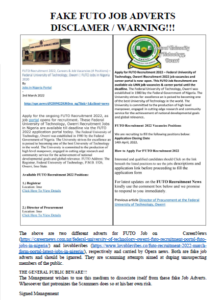Environmental Health Science as a discipline focuses on all factors in man’s physical environment which exercise a deleterious effect on his physical development, health or survival. It examines those aspects of human health, including quality of life, which is determined by physical, biological, chemical, social and psychological factors in the environment. The discipline also studies the theory and practice of assessing, correcting, controlling, and preventing these factors that can potentially affect adversely the health of present and future generations. Environmental health programmes are organized community efforts to monitor and modify man-environment-relationships in the interest of better health. The programme applies social science theories for the explanation of behavioural aspects of health and medicare.
The major aspects of Environmental Health Science include Hygiene Education and Promotion/Sanitation, Fundamentals of Epidemiology/Enforcement of Environmental Health Standards, Control of Communicable and Non-Communicable Diseases and Surveillance, Water Resources/Management of Emergency Situations, Environmental Health Laboratory, Occupational Health and Safety, Radiation Health and Air Quality Control, etc. Internationally, Environmental Health is a regulated profession. In Nigeria, Act 11 of 2002 established the Environmental Health Officers Registration Council, a body mandated with the regulation of Environmental Health Training and Practice.
In February 2016, the Senate of the Federal University of Technology, Owerri (FUTO) at her 402nd meeting held on Thursday 25th February 2016 graciously approved the creation of the Department of Environmental Health Science from the Department of Public Health. Professor I. N. S. Dozie was the first Coordinator of the new Department from 2016 to June 2017, and Dr. (Mrs) S. I. Umeh became the pioneer, Ag. Head of the new Department in July 2017 till date.


